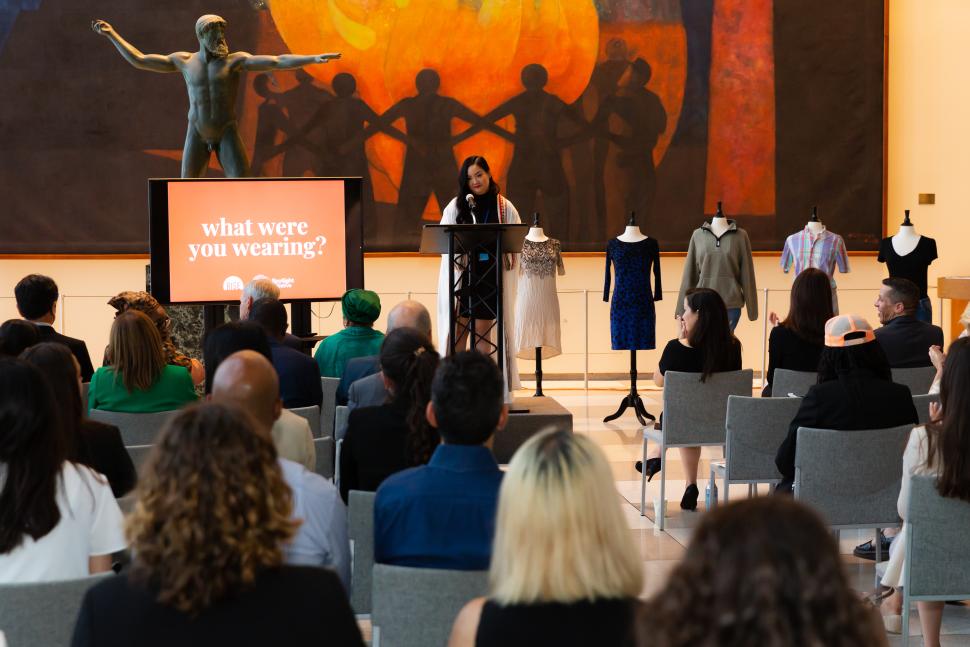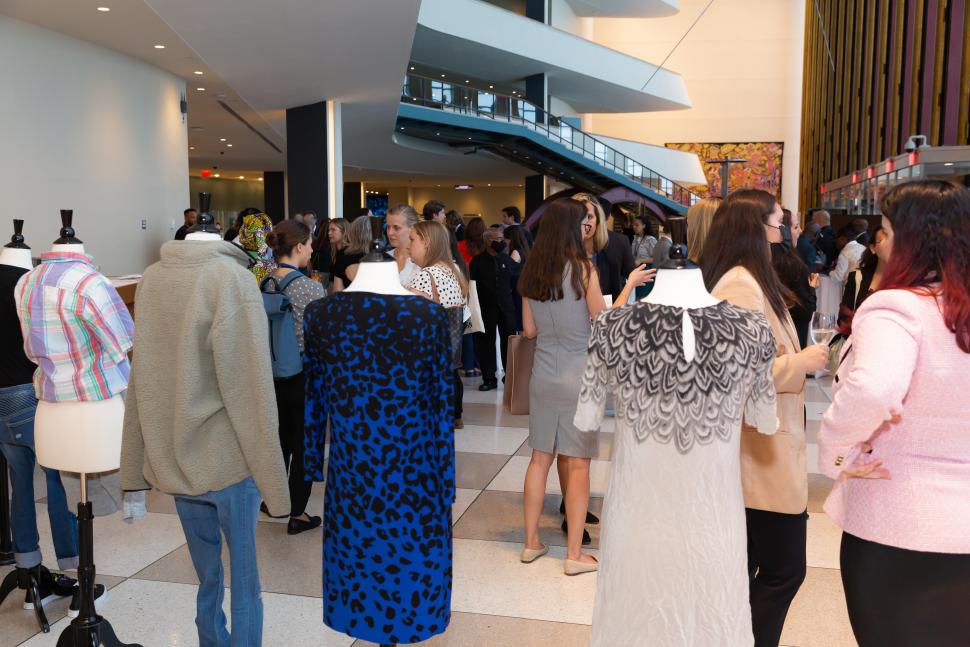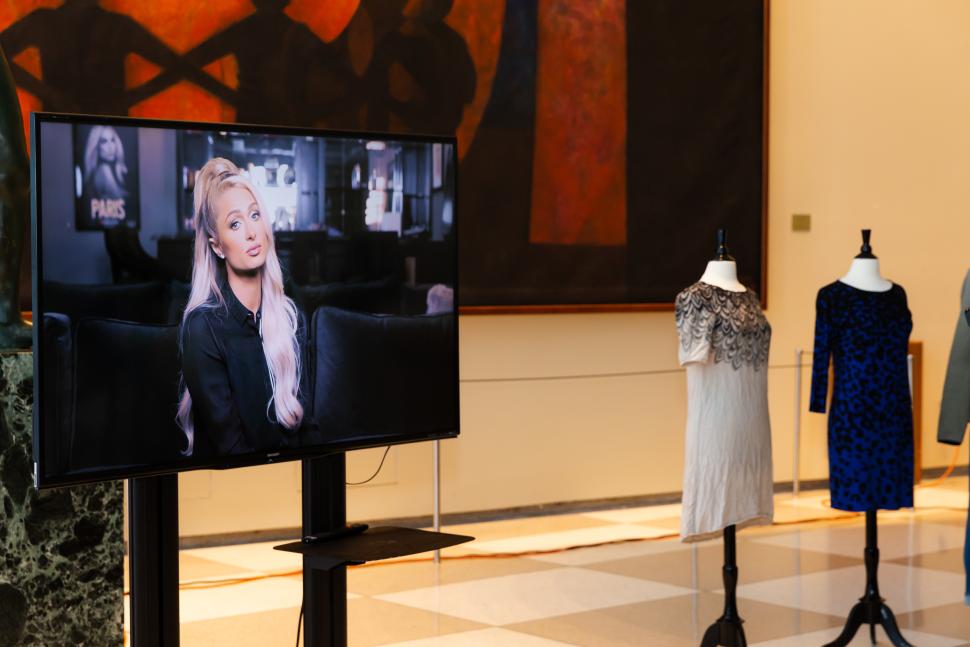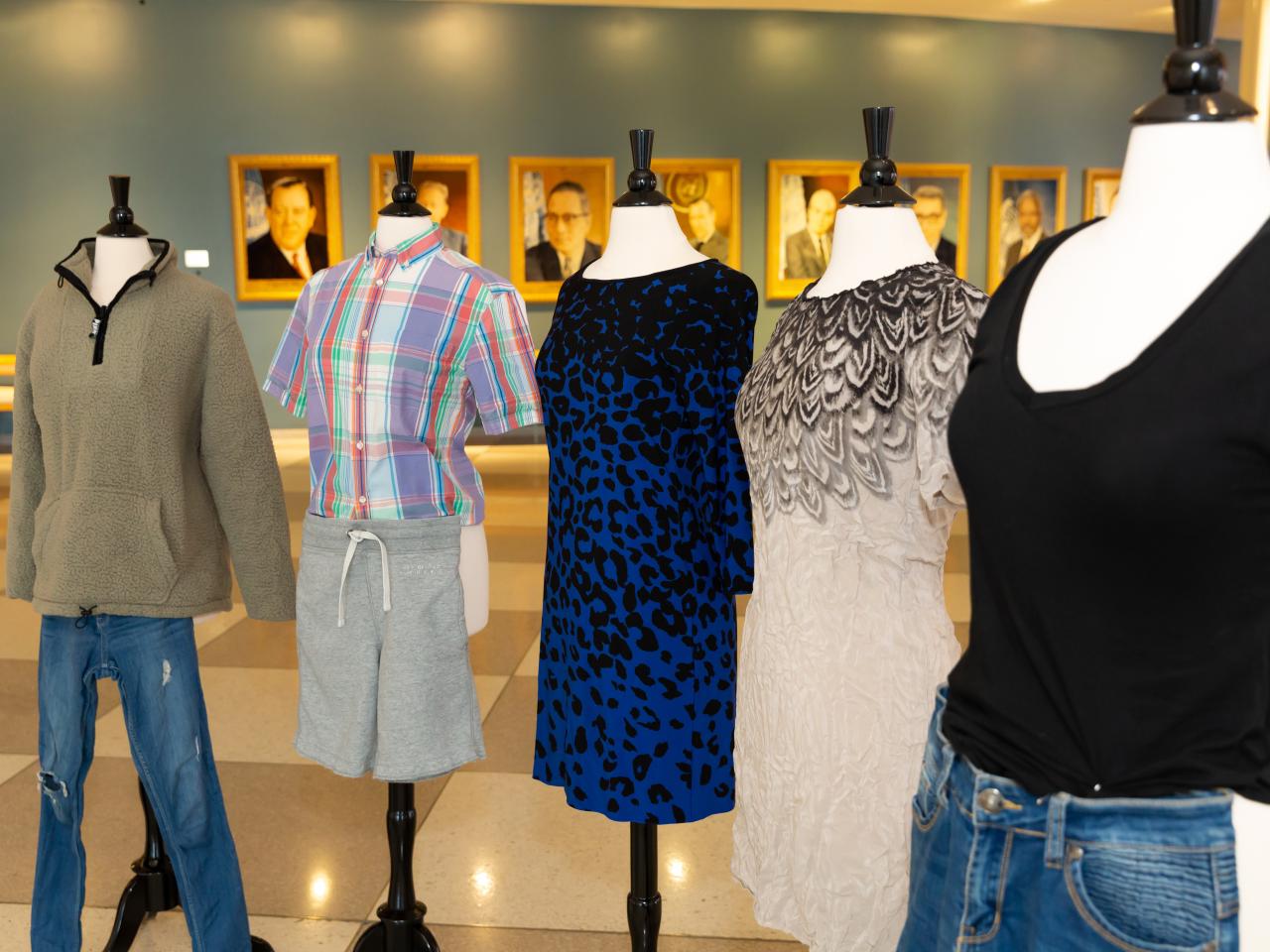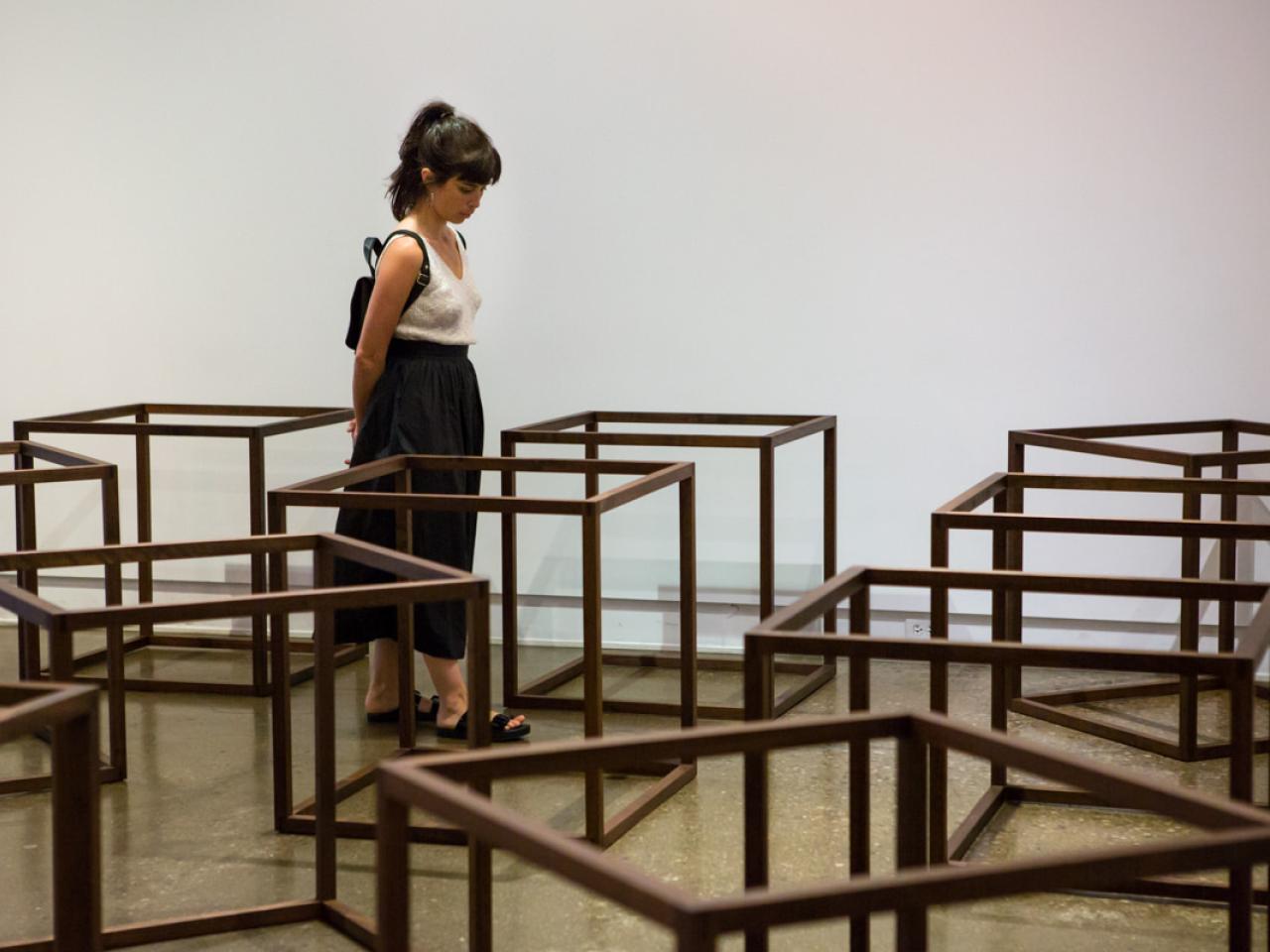What were you wearing? UN exhibit demands justice for survivors of sexual violence
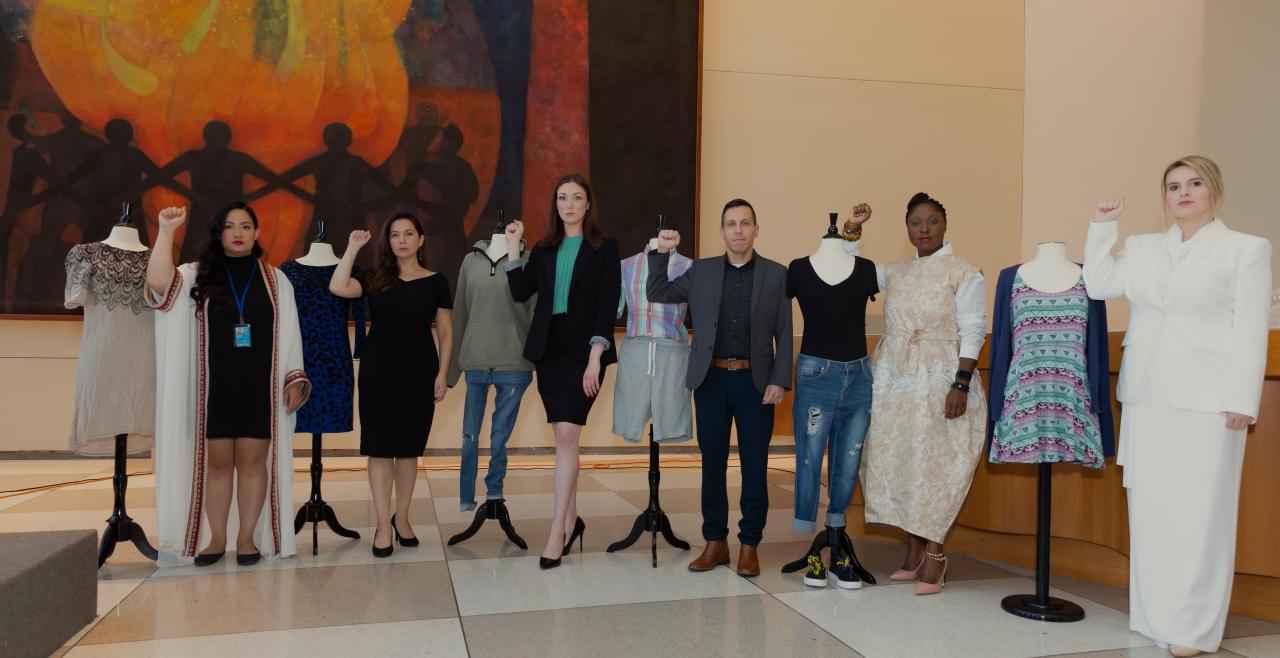
NEW YORK, United States - On 11 July, international dignitaries attended the opening of ‘What were you wearing?’ an art exhibit at United Nations Headquarters in New York City. The exhibit showcases 103 outfits worn by rape survivors at the time they were attacked, representing the 1.3 billion survivors of sexual assault worldwide.
“We can hold light up to this darkest corner of human experience and allow survivors at last to be seen, to be heard, to be believed and to be empowered." - RISE Founder and CEO Amanda Nguyen
A collaboration between RISE and the Spotlight Initiative, the exhibit highlights the pervasiveness of sexual assault by subverting the phrase “what were you wearing” – a question that is too often used to blame survivors for the crime perpetrated against them.
The original exhibit opened in December 2021 and consisted of just five outfits, each representing a different geographical region.
“Today, all five of the survivors have stepped out of anonymity to tell their story to the world at the United Nations,” said RISE CEO and Founder Amanda Nguyen in her opening address. “I am one of the five… My story is not mine alone.”
“We can hold light up to this darkest corner of human experience and allow survivors at last to be seen, to be heard, to be believed and to be empowered,” she said.
“‘What were you wearing? Were you drinking, were you dancing, were you smiling too much?’ Those were the questions they asked me after spending hours in two hospital waiting rooms,” said Jessica Long, an author, business expert and assault survivor whose clothes were featured in the exhibit. “You might think that being assaulted was the worst thing that happened to me that night, but it wasn’t. The worst thing that happened to me was being betrayed by the very systems that are meant to support us and protect us… Every year tens of millions of people experience exactly that betrayal.”
Britney Lane, a child and adolescent therapist and survivor of assault, echoed the need for better access to services and justice, saying, “I can’t change what happened to me that night, but I can work to change the system to ensure that no one is failed again.”
Bryan Robles, an Aerospace Engineer with NASA, shared his story for the first time outside his immediate family, telling the audience, “These pieces of clothing represent everyday people just like me… Sexual assault is indiscriminate. It reaches every part of society – whether we’re rich, whether we’re poor, whether we’re in the good neighbourhood or the bad neighbourhood. Sexual assault is an unrelenting predator.”
“These pieces of clothing represent everyday people just like me… Sexual assault is indiscriminate. It reaches every part of society." - NASA Aerospace Engineer and assault survivor, Bryan Robles
Fashion designer and survivor Kadijatu Grace shared her own story of being raped while fleeing conflict. She addressed her attacker and expressed defiance, stating, “You thought you broke me, but you gave me a platform. I will never stop singing, I will never stop telling my story.”
Samantha McCoy, an attorney and survivor, described being raped by a police officer at the age of 22 and the desperate need for informed, sensitive and effective support to those who experience sexual violence. “I was left with physical injuries but most devastating was the unimaginable mental anguish,” she said. “Crucial mistakes were made in the collection of evidence. I was criticized doubted and asked questions that victims of other crimes are not asked such as ‘what were you wearing?’”
President of the UN General Assembly Abdulla Shahid said that the exhibition had stopped him in his tracks. “It should be a catalyst to spur conversation about our collective responsibility to eliminate violence against women and girls,” he said.
Deputy Secretary-General of the United Nations and co-chair of the Spotlight Initiative's Governing Body, Amina Mohammed, thanked the survivors for their bravery and called on those gathered in the room to address violence before it begins.
“We need to stop playing the blame game and take action to address the root causes of violence." - Deputy Secretary-General of the United Nations Amina Mohammed
“We need to stop playing the blame game and take action to address the root causes of violence: gender inequality, patriarchal structures in our societies,” she said. “[These clothes] demonstrate more clearly than any legal argument could that women and girls are attacked regardless of what they were wearing,” continued Ms. Mohammed. “Indeed, the power of some of these clothes lies in their ordinariness.”
European Union Ambassador to the United Nations Olof Skoog, who also convenes the Group of Friends for the Elimination of Violence Against Women and Girls, expressed admiration for the speakers. “We see you, we hear you, we recognize and acknowledge you,” said Mr. Skoog. “We want your help to improve the way we deal with this [issue], including in the way we provide justice.”
Ambassador Victoria Sulimani, Deputy Permanent Representative of Sierra Leone to the United Nations, highlighted the fact that sexual violence is a universal issue that demands concerted international recognition. She spoke about the steps that Sierra Leone has taken to increase access to justice after the president declared sexual violence a state of emergency. “Justice delayed is justice denied,” she said.
“We see you, we hear you, we recognize and acknowledge you.” - European Union Ambassador to the UN Olof Skoog
Deputy Permanent Representative of Japan to the UN, Takeshi Osuga, said that the exhibition was “heartbreaking” and expressed Japan’s commitment to achieving gender equality. “For Japan, gender equality is one of the most important pillars of promoting human security and for us, it consists of two aspects: one is protection and the other is empowerment.”
Entrepreneur and activist Paris Hilton shared her own story and expressed solidarity with survivors in a video message.
‘What were you wearing?’ will be on display at the UN Visitors Centre in New York until 31 August 2022.

